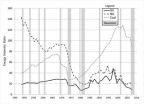(Press-News.org) With the emergence of an epidemic of obesity and type 2 diabetes (DM) throughout the world, the association of lifestyle habits that may affect the risk of metabolic diseases is especially important. Most prospective studies have shown that moderate drinkers tend to have about 30% lower risk of developing late onset diabetes than do non-drinkers, and moderate drinkers also tend to be at lower risk of developing metabolic syndrome (MS). A cross-sectional analysis of 6172 subjects age 35 -75 in Switzerland related varying levels of alcohol intake to the presence of DM, MS, and an index of insulin resistance (HOMA-IR).
Alcohol consumption was categorized as non-drinkers (0), low-risk (1 drinks a week), medium-to-high-risk (14) and very-high-risk (= 35) drinkers. 73% of participants consumed alcohol, 16% were medium-to-high-risk drinkers and 2% very-high risk drinkers
Study findings: In multivariate analysis, the prevalence of the metabolic syndrome, diabetes and mean HOMA-IR decreased with low-risk drinking and increased with high-risk drinking. Adjusted prevalence of the metabolic syndrome was 24% in non-drinkers, 19% in low-risk, 20% in medium-to-high-risk and 29% in very-high-risk drinkers. Adjusted prevalence of diabetes was 6.0% in non-drinkers, 3.6% in low-risk, 3.8% in medium-to-high-risk and 6.7% in very-high-risk drinkers. These relationships did not differ according to beverage types.
Moderate drinkers also had the lowest weight, tryglycerides, and blood pressure. All drinkers had higher HDL-cholesterol values (that is 'good cholesterol) than did non-drinkers.
Forum comments:
Metabolic syndrome is the name given to a so called 'lifestyle disease', where patients exhibit multiple medical problems including high blood pressure, late on set diabetes, and high cholesterol.
The strengths of this paper include being population-based and having a large number of subjects who reported that they consumed 14 or more drinks/week. Also, there was a good percentage (27%) of subjects reporting no alcohol intake during the one week of assessment used for classifying subjects. Another strength is the careful confirmation of drinking status with state-of-the-art laboratory tests. In multivariate analysis, the prevalence of the metabolic syndrome, diabetes and mean HOMA-IR decreased with low-risk drinking and increased with high-risk drinking. No differences were noted according to the type of beverage consumed.
This is a cross-sectional analysis, so a causative relation between alcohol intake and the metabolic outcomes cannot be assessed. Still, the data supports much that has been shown in prospective studies. Several Forum members commented on potential problems when considering a number of physiologic conditions as the "metabolic syndrome" and focusing therapy on the syndrome; they believed that each metabolic factor should be evaluated and treated singly.
###
Reference: Clerc O, Nanchen D, Cornuz J, Marques-Vidal P, Gmel G, Daeppen J-B, Paccaud F, Mooser V, Waeber G, Vollenweider P, Rodondi N.
Alcohol drinking, the metabolic syndrome and diabetes in a population with high mean alcohol consumption. Diabet Med 2010;27:1241�.
Contributions to this critique by the International Scientific Forum on Alcohol Research were provided by the following members:
Arne Svilaas, MD, general practice and lipidology, Oslo University Hospital, Oslo, Norway
Erik Skovenborg, MD, Scandinavian Medical Alcohol Board, Practitioner, Aarhus, Denmark
Ulrich Keil, MD, PhD, Institute of Epidemiology and Social Medicine,
University of Münster, Münster, Germany
Harvey Finkel, MD, Hematology/Oncology, Boston University Medical Center, Boston, MA, USA
R. Curtis Ellison, MD, Section of Preventive Medicine & Epidemiology, Boston University School of Medicine, Boston, MA, USA
For the detailed critique of this paper by the International Scientific Forum on Alcohol Research, go to www.alcoholforum4profs.org and click on http://www.bu.edu/alcohol-forum/988/
The specialists who are members of the Forum are happy to respond to questions from Health Editors regarding emerging research on alcohol and health and will offer an independent opinion in context with other research on the subject.
END
Through an innovative use of cell phone records, researchers at UCLA, the University of Miami and Cal State, Fullerton, have found that women appear to avoid contact with their fathers during ovulation.
"Women call their dads less frequently on these high-fertility days and they hang up with them sooner if their dads initiate a call," said Martie Haselton, a UCLA associate professor of communication in whose lab the research was conducted.
Because they did not have access to the content of the calls, the researchers are not able to say for sure why ovulating women ...
DURHAM, N.C. – As the U.S. Environmental Protection Agency weighs whether to define coal ash as hazardous waste, a Duke University study identifies new monitoring protocols and insights that can help investigators more accurately measure and predict the ecological impacts of coal ash contaminants.
"The take-away lesson is we need to change how and where we look for coal ash contaminants," says Avner Vengosh, professor of geochemistry and water quality at Duke's Nicholas School of the Environment. "Risks to water quality and aquatic life don't end with surface water contamination, ...
DURHAM, N.C. – Long a staple of nature documentaries, the somewhat bizarre development of a grub-like pink marsupial embryo outside the mother's womb is curious in another way.
Duke University researchers have found that the developmental program executed by the marsupial embryo runs in a different order than the program executed by virtually every other vertebrate animal.
"The limbs are at a different place in the entire timeline," said Anna Keyte, a postdoctoral biology researcher at Duke who did this work as part of her doctoral dissertation. "They begin development ...
DURHAM, N.C. -- Humans are known to play it safe in a situation when they aren't sure of the odds, or don't have confidence in their judgments. We don't like to choose the unknown.
And new evidence from a Duke University study is showing that chimpanzees and bonobos, our closest living primate relatives, treat the problem the same way we do.
In studies conducted at the Tchimpounga Chimpanzee Sanctuary in Republic of Congo and Lola ya Bonobo Sanctuary in Democratic Republic of Congo, researchers found the apes prefer to play it safe when the odds are uncertain.
Graduate ...
A national conversation continues about the best ways to improve both the quality of medical care and to contain costs. So far, developing quality measurements has focused on primary care or highly prevalent, chronic conditions such as asthma and diabetes. But what about brain disorders? To date, the number of measures that apply to neurologic care has been limited.
The American Academy of Neurology (AAN), an association of more than 22,500 neurologists and neuroscience professionals, reached out to a group of neurologists to develop such a set of measurements. Led ...
If fossil fuels burn completely, the end products are carbon dioxide and water. Today the carbon dioxide is a waste product, one that goes into the air — adding to global warming; or the oceans — acidifying them; or underground — with as yet unknown consequences.
But it's not impossible, says Liviu M. Mirica, PhD, assistant professor of chemistry at Washington University in St. Louis, to drive things the other way, turning carbon dioxide into fuels such as methanol or hydrocarbons.
Until now reversing combustion has been a loser's game, because making carbon dioxide ...
An overlooked cause of the economic recession in the U.S. is a decade long decline in the quality of the nation's energy supply, often measured as the amount of energy we get out for a given energy input, says energy expert Carey King of The University of Texas at Austin.
Many economists have pointed to a bursting real estate bubble as the initial trigger for the current recession, which in turn caused global investments in U.S. real estate to turn sour and drag down the global economy. King suggests the real estate bubble burst because individuals were forced to pay ...
DALLAS, Nov. 29, 2010 — Women with a history of migraine headache with aura (transient neurological symptoms, mostly visual impairments) are at increased risk of stroke. However, according to new research reported in Circulation: Journal of the American Heart Association stroke events in women with migraine with aura are more likely to have mild or no disability compared to those without migraine.
In a new analysis of the Women's Health Study involving 27,852 women over 13.5 years, researchers found those who have migraine with aura and who experience an ischemic stroke ...
TEMPE, Ariz. – Glass is something we all know about. It's what we sip our drinks from, what we look out of to see what the weather is like before going outside and it is the backbone to our high speed communications infrastructure (optical fibers).
But what most people don't know is that "glass transitions," where changes in structure of a substance accompanying temperature change get "frozen in," can show up during cooling of most any material, liquids through metals. This produces "glassy states," of that material – exotic states that can be unfrozen and refrozen by ...
New Haven, Conn.—The risk of dying from a heat wave is highest when heat waves occur early in the summer and are hotter and longer than usual, according to a Yale study published in the journal Environmental Health Perspectives (EHP).
During the first heat wave of a summer, the risk of mortality increases 5.04 percent, compared to 2.65 percent for heat waves that occur later in the summer. Michelle Bell, a co-author of the study and associate professor of environmental health at the Yale School of Forestry & Environmental Studies, said that people may be less accustomed ...

